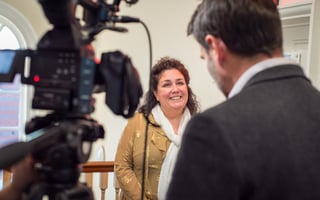Have you ever wondered exactly what you would learn on a media training course?
How would you respond to a question that asked you to comment on one of your competitors?
Maybe you think their product is inferior – would you take the opportunity to bash them?
What about if you like what they are doing? Would you want to discuss what they are doing in detail?
We often ask delegates on our media training courses questions about their competitors, and we would not recommend they take either of these approaches.
Fortunately, a CEO gave a great example of how to deal with this tricky type of question.
Jim Farley, the boss of Ford, appeared on the Decoder podcast to discuss its evolution as an electric vehicle company, having recently electrified two of its iconic brands.
Inevitably, the conversation moved to comparisons with Tesla.
Having already faced a question about the growing competition between the two companies, Mr Farley was asked whether he was tempted to take a similar social media approach as the one used by Elon Musk.
And he produced an excellent answer that closed that particular line of questioning.
He said: “Look, I have to tell you that I have nothing but respect for Tesla.
“It was one of the most magical things that happened in our industry, to see a company so single-minded, so focused on simplicity and really reinventing the customer experience. We’ve had some moments on Twitter actually around BlueCruise.
“Ford’s a customer company. We’ve been in business for 118 years because we’re focused on customers, especially in these kind of iconic spaces like Mustang or Bronco or F-150. I admire companies that are like us who are focused on customers. And I think they’ve done a great job. It’s just pickup truck customers are a little bit different.”
Ignoring that the response started with an annoying “look” – we covered spokespeople using filler words in a blog last week – this is a good response to a question that is trickier than Mr Farley made it look.
It is a question that has the potential for controversy.
Conflict is a crucial component in news stories. Journalists love it and they particularly enjoy pitting one side against the other.
Think about how much media coverage focuses on row stories.
As I write this media training blog, there are reports of a cabinet row over Brexit trade talks. There is constant media coverage of the rowing royal family, and the nation is still recovering from the caterpillar cake conflict between Marks & Spencer and Aldi.
And this why we spend time focusing on the Trouble element of the TRUTH (Timely, Relevant, Unusual, Trouble, Human) model we use to describe what makes something newsworthy during our media training courses.
If the Ford boss had responded to the question by launching into criticism of Tesla, that would have become the focus, taking the spotlight away from the issues Mr Farley presumably wanted the podcast, and subsequent coverage, to concentrate on.
It doesn’t take too much imagination to think of headlines along the lines of “Ford boss slams Tesla.”
The other great aspect of Mr Farley’s response is that he didn’t spend much time discussing Tesla, quickly steering the conversation back to Ford.
A good rule is that all the time you spend talking about your rivals is time you are not using to discuss your own business and its products. Why give them the publicity?
Now, Mr Farley was taking part in a podcast interview, and its longer format offers more opportunity for him to bring the focus back to Ford.
But let’s say your organisation’s spokesperson faced a similar question during a radio interview.
The average radio interview is about two and a half minutes long. You can’t afford to waste much of that talking about other businesses.
On our media training courses, we advise delegates to avoid the temptation to bash their rivals or to spend valuable interview time praising them.
The bridging technique is crucial here, particularly for interviews shorter than the podcast format. You can say something like, “I’m sure they (competitors) can speak for themselves, but what I can tell you is…” and then move on to your company’s strengths.
Mr Farley’s interview is also a valuable reminder that tricky questions can appear when you least expect them.
Speaking to a tech journalist on a podcast, on the face of it, might not appear as the most challenging interview. But, as well as ensuring he was on top of all the technology advancements in his vehicles, Mr Farley needed to be aware of the potential pitfalls.
Not only did he spot it, but he navigated it well.
Media First are media and communications training specialists with over 35 years of experience. We have a team of trainers, each with decades of experience working as journalists, presenters, communications coaches and media trainers.
Subscribe here to be among the first to receive our blog.




